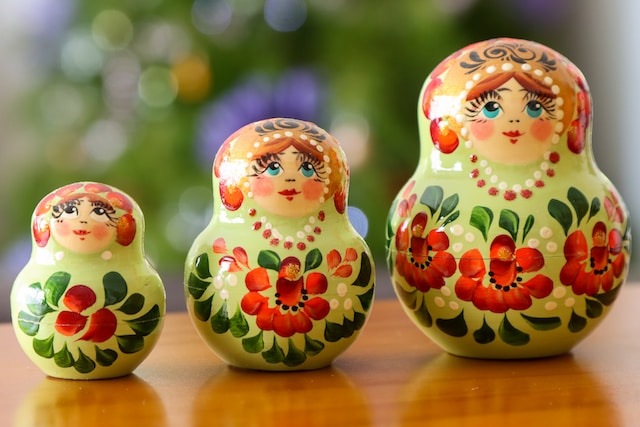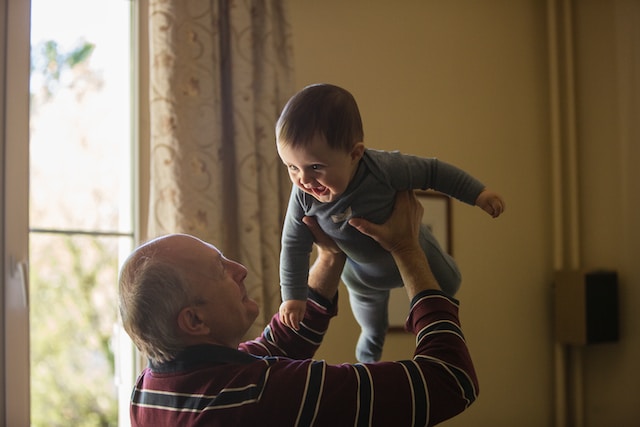Uh oh.
We’ve got another endangered species to add to the growing list.
Yet again, we’re on the cusp of losing one of nature’s most precious creatures.
What’s worse? This particular loss appears to be irreversible. Yep, at the rate things are progressing, it won’t be long before we have to corral into preserves the few that are left to us. One thing is certain: we’ll be seeing fewer of them dancing the Funky Chicken at family weddings.

… the extinction of the parent of the parent of the parent.
It has come to pass that we find ourselves facing the extinction of the parent of the parent of the parent.
Farewell great-grandma.
Adieu great-granddad.
Do the math.
The average age of Canadian mothers when they give birth to their first child has been steadily rising since the 1960s. Since 2010, the average age of first time mothers has been over the age of 30. This gets interesting when you consider that a great number of those 30-plus years old moms were the child of a woman who had her first child when she, herself, was well into her thirties.

People marry later in life now. In 1972, Canadian women were, on average, 23 years old when they went down the aisle; their grooms were 25. Today, the median age for both sexes is closer to 29 years. Young couples also tend to delay starting a family until a few years into the relationship. That means the numbers stack up against the likelihood of great-grandparenthood. If today’s first time mom is, let’s say 32, and her mom was also 32 when she gave birth to her daughter, and then you add in the mom’s mom who was, maybe 24 when her own daughter was born, that great-grandmother would be in her late 80s when her first great-grandchild was born. Given that StatsCan says that the average Canadian woman can expect to live to around 82 years of age, if you’re lucky enough to get a great-grandmother, you won’t have her for long.
… the numbers stack up against the likelihood of great-grandparenthood.
Before we started delaying matrimony and parenthood, first time moms were usually in their early 20s. The compounding equation here usually resulted in a great-grandmother who would have been in her late 50s or early 60s. This was unexceptional. If it’s exceptional you’re interested in, then consider country singing legend Loretta Lynn who became a grandmother at the age of 29. She also has the rare distinction of being, at the time of her death in 2022, a great-great grandmother to three.

Country singing legend, Loretta Lynn, wasn’t yet 30 when her first grandchild arrived.
The same math applies to great-grandfathers. They’re even rarer as men tend to marry a little later in life. On the plus side, people today tend to be more vital into their advanced years. Nevertheless, those birthdays do take a toll. Seventy may be the new 60 and 60 may be the new 50 but, at 80, nine pm is the new midnight.
Love ‘em though we may, this is not a cohort you want babysitting the little ones.

So, great-grandparents are on their way to extinction. Does this really matter? Will we miss those birthday cards with a $5 tucked inside them? I suppose the question is what role does the grandparent play in a family and in society, in general.
Context is a big part of what grandparents offer.
Context is a big part of what grandparents offer. They have insights and perspectives that can only be earned through a bonfire of birthday candles. If your great-grandfather shares his stories about his role in the liberation of the Netherlands in WWII, a visit to Holland will have different undercurrents for you. When your great-grandmother tells you about the restrictions on her aspirations, you’re able to internalize the strides women have made in the last fifty years.

The other side of the equation is what it must be like to hold a great grandchild in your lap; when your beloved’s beloved has her own beloved. Poet William Blake says it’s possible to see “a world in a grain of sand” … that you can “hold infinity in the palm of your hand and eternity in an hour”. This, I imagine, is what it must be like to become a great-grandparent.
So, all that, plus, what’s not to like about getting an actual birthday card; one with $5 tucked inside?
This week’s question for readers:
HOW IMPORTANT ARE GRANDPARENTS?
Leave your Comments below!
Register for The Plain Jane newsletter and stay up to date with upcoming contests.
Submissions to last week’s question:
Do you speak more than one language? If so, how did you acquire this language?
In my first 25 years I spoke German, and English in the remaining 70 years. I learned French through self-study, being tutored and spending one year in Geneva and two months in France. I could converse in French, but no longer. I took several continuing education Spanish classes and was able to read Spanish-language poetry and newspaper articles, but no longer.
Martin Meissner
Learned some French at grammar school. Went on a school trip to Paris and Montreux at age 12. Loved France! Married a Parisienne. I now have a holiday home on the lakefront across from Montreux. Spent 2-3 months there annually, pre-Covid. Now losing it after 3 year absence. Have TV5 on the TV at home. Can follow the news. Try to parle at least once a week. Also have menu-Spanish.
John Allen
I was brought up as a first generation Canadian. British army officer father married his German translator after WW2. Because of the war my father learned many languages. My mother, too, was multilingual, hence our family was immersed in the languages and cultures of the world. Father often would invite home interesting people he met in Vancouver from around the world. I was good at written French but not so good at spoken French until I traveled the world. I married a Frenchman and later lived in France, then Québec. My children are multilingual, speaking French, English and Spanish. Speaking more than one language has opened doors of opportunity and created more diverse friendships. People don’t understand the value of being multilingual, it doesn’t have to be French.
Margaret Dutilloy
My parents are Italian, met in Montreal, married, and had five kids. Dad spoke Italian and French; mom spoke Italian and English. They spoke Italian at home until the first child started school. He was sent to French school, mom learned French through his studies, the other two boys followed suit. When my sister and I were born, mom sent us to English school as it was time for dad to learn English. My parents became trilingual through our studies. At home French was our mother tongue, however, everyone benefited from speaking both languages. Then I decided to learn Italian because my parents would speak Italian to each other when they didn’t want us to understand their conversations. I took a semester at McGill University then studied at the Italian Consulate. I was just fortunate to have had this opportunity to learn three languages due to both our heritage and where we resided.
Gloria Bramucci
I am fluent in three languages – English, French, and Spanish – and functional in several others. My undergraduate degree is in French, Spanish, German, and Italian. I went to university in Québec and traveled for about 20 years in Latin America. I also study languages before I travel. I just got back from Uzbekistan, Kazakhstan, Kyrgyzstan, Tajikistan and Turkmenistan, where Russian is the “lingua franca”.
I know just enough words in Arabic and Hebrew to get me in trouble.
Danielle Bretton
Your article on polyglots reminded me of a fellow that was a neighbour of mine when I was kid. My mother (who spoke Slovak) and his mother (who spoke Polish) were friends. Many Slavic languages are similar so they were able to converse quite readily. Visiting him one day, I learned of his interest in languages. I remember that he mentioned his interest in getting into the Guinness Book of Records. I looked up the record for most fluent in languages and found that this former neighbour is listed! His name is Powell Janulus. In 1985 he was entered in Guinness with 42 languages. As far as I know this is still the record for fluency. I haven’t seen or heard of him for over 60 years. We have both moved many times but it turns out that he lives not too far from me now.
Tony Shelling
I have spoken English, French, and Italian since childhood. It was a happy accident of birth in Montreal, and living with my Italian grandparents. I was not consciously aware of being trilingual at that age, as I heard all three languages in the home. It was a mixed neighbourhood, and when I went out to play with the kids on the street, if one didn’t understand what I was saying, guess I would just switch gears without being aware of it.
I feel that immersion is the best language learning method, beginning in early childhood, when kids are imitative, and not embarrassed to make ‘odd’ sounds. High school is too late, as teens are woefully self-conscious about the whole idea of speaking in front of the class and sounding funny.
I have a friend who is a true polyglot, speaks multiple languages, including difficult Asian languages and tribal languages which are not taught anywhere. Of course, he is hyper-intelligent, and has always had a fascination with language learning. In his fifties and still learning.
Bruno Bandiera
In 1978 as a 22 year old university grad, I took a fun, 18 hour Dutch language evening course. I then left for the Netherlands to travel and work. I found employment at a steel fabrication plant near Amsterdam and was tasked with more skilled duties, including working in the lab. I knew only a handful of Dutch words. I was given a month to be proficient enough to do the job, so I was motivated. Armed with my lesson book, I practiced vocabulary every coffee and lunch break with my helpful Dutch colleagues, kept the job for 6 months, and became confidently conversant. Very satisfying!
Steve Vandervelden
Spanish and Chinese might be useful but French is dead just like interest in Quebec is dead.
John Stark
I speak six languages: Croatian, Montenegrin, Serbian, Italian, Hungarian and English. I say this to impress people. On a serious side, it’s really only four.
Serbian, Croatian and Montenegrin are virtually the same languages with Croatian being a bit more distinct. We like to call them our own language because that is “them” and this is “us” but when we speak we understand each other perfectly well. This is the consequence of the Yugoslav war.
I grew up in Montenegro, while it was part of Yugoslavia where the official language was called Serbo-Croatian. My family is Hungarian and that is the language I learned first. My mom was an English teacher and we learned English from grade four all the way through university. On the seaside where we lived, we used lots of pigeon Italian, sort of a local dialect. It’s a bit rusty now, but passable. So, officially four but six for fun.
Csaba Magyar
I love languages, and speak bits of about a dozen. I’m fluent in French. I began my French learning in elementary school with a great teacher, majored in French at UBC, and taught French to elementary grades for over 30 years. The enjoyment of languages for me comes with using them whenever the opportunity arises. People from other countries are nearly always surprised and pleased to meet a western Canadian who can converse with them in their mother tongue.
Kathy Mukai
I learned French via 12 years in school, an overzealous mother, lots of hard work on irregular verbs etc., and a year at McGill and in Switzerland, which included trigonometry and chemistry in French! I also read many contemporary French novels, including the puzzling Sartre. My friends said I had an 18th century turn of phrase, as a result. At McGill we had wonderful French history/politics classes in French, but my facility with German was short lived. I left Montreal in 1961, about the time they stopped teaching any English in the schools, but have enjoyed reading French since then and using it when cycling the length of France in ‘94.
Lesley Bohm.
My parents from Manila spoke Tagalog. My grandparents spoke Spanish. My grandfather came from another province and spoke Pangasinan with my family. I grew up in Baguio City, summer capital of the Philippines, where people spoke Ilocano. I naturally learned these languages and dialects. From elementary to university, English was the medium of instruction. Sixteen credits of Spanish were required for my B.A. I earned postgraduate degrees and a Ph.D. in Leuven, Belgium where courses were taught in Flemish. I learned French on the side since Belgium is a trilingual country. I still speak these languages, but I need practice.
John Marasigan
I grew up in what was then a primarily English speaking part of Montreal. The curriculum at school consisted of only one French class and I struggled to understand or carry-on a reasonable conversation. After a brief hiatus in Ontario, I took a job in the Quebec Eastern Townships and befriended two non-speaking Francophone women who must have been closet school teachers because they took every opportunity to correct my deplorable French. Over time and with their dogged persistence my French started to dramatically improve. Sometimes necessity truly is the mother of invention!
Avrum Miller
